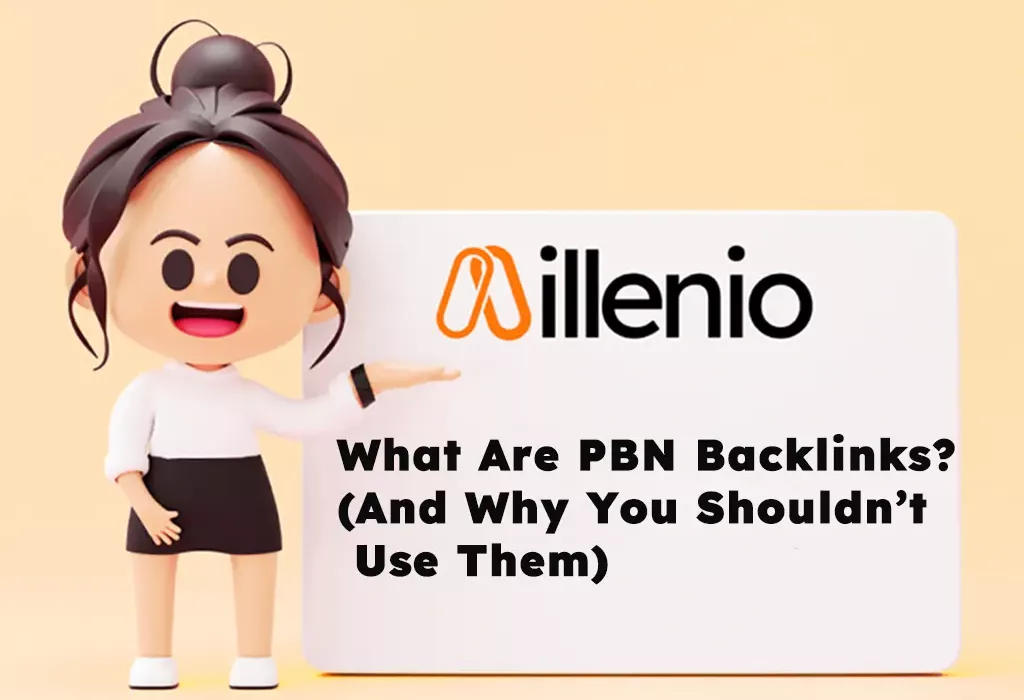by Liam Cook
March 10, 2024
0

In today’s fast-paced digital landscape, where online competition is fierce, website owners and digital marketers are in a perpetual quest to enhance their online presence. The ultimate goal? Securing a coveted spot on the hallowed ground of search engine results pages (SERPs). In this relentless pursuit of visibility, a multitude of strategies and tactics have emerged, each vying for attention in the ever-evolving world of search engine optimization (SEO). One such strategy that has captured the imagination of many in recent years is the use of Private Blog Network (PBN) backlinks.
SEO practitioners are well aware that achieving a high ranking on SERPs can be a game-changer, potentially driving substantial organic traffic and, consequently, boosting business outcomes. It’s this allure of higher rankings and the accompanying benefits that make PBN backlinks a tempting proposition. They promise a seemingly convenient shortcut to ascend the search engine ladder swiftly.
However, as with most shortcuts, the allure of PBN backlinks is accompanied by a host of red flags and pitfalls that warrant cautious consideration. While these backlinks may hold the promise of rapid success, they also come laden with significant risks that have the potential to tarnish your website’s SEO efforts. In this comprehensive guide, we will embark on a journey to explore the depths of PBN backlinks. We’ll decipher what exactly they are, dissect why you should steer clear of them, and unveil the safer, more ethical alternatives that exist for fortifying your website’s SEO. So, let’s dive in and equip you with the knowledge needed to make informed decisions in the pursuit of online visibility and success.

The acronym PBN, which stands for Private Blog Network, conceals a rather intricate and often contentious facet of the digital marketing and SEO world. To fully grasp the mechanics and implications of PBN backlinks, let’s delve deeper into what PBNs are and how they operate.
In essence, a PBN is an interconnected web of websites, typically owned by a single individual or entity, that is meticulously crafted to masquerade as a constellation of distinct, unrelated online entities. The fundamental purpose underpinning the existence of these websites within the network is to serve as conduits for the creation of backlinks leading to other websites, a category often referred to as the “money site.”
The term “money site” signifies the website that stands to gain the most from the orchestrated deployment of backlinks originating from the PBN. It is the digital cornerstone of a business or an endeavor, the website whose success is intrinsically tied to its visibility on search engine results pages (SERPs).
The operational dynamics of PBNs are akin to a well-orchestrated symphony of digital manipulation, and they merit a closer examination.
PBN proprietors embark on a multifaceted journey that commences with the acquisition of domain names, which are either expired or procured through auctions. These domains come with a crucial advantage – existing authority and backlinks from their previous digital lives. This authority is akin to a digital inheritance, a vestige of the past, which is coveted for its potential to confer credibility upon the websites it is now entrusted to.
Once in possession of these authoritative domains, PBN operators set about the task of breathing life into them. They craft content, often generic and formulaic in nature, but just sophisticated enough to give the semblance of legitimacy. These content pieces serve as the veneer of credibility, the camouflage that cloaks the true purpose of these websites.
Crucially, these PBN websites are not isolated entities; they are intricately interlinked within the network, forming a labyrinthine web of connections that, at first glance, appear to be genuine and natural.
The ultimate move in this carefully choreographed SEO strategy is the strategic insertion of backlinks leading to the money site. These backlinks are artfully woven into the content of the PBN websites, designed to appear as if they are there for informational or contextual purposes. The goal is simple yet audacious: to harness the authority and trustworthiness inherited by the PBN domains to propel the money site up the rungs of the search engine ranking ladder.
However, this strategy is far from a guaranteed path to SEO success. As we venture further into this exploration of PBN backlinks, we will uncover the intricacies of the risks involved and why this approach is often viewed with skepticism and caution in the world of digital marketing.
One of the primary lures that beckon website owners and digital marketers into the clandestine world of PBN backlinks is the tantalizing promise of swift and remarkable results. In the competitive arena of digital marketing and SEO, where time is often of the essence, the prospect of a shortcut to higher search engine rankings can be nothing short of irresistible.
PBNs, in their essence, serve as a mechanism for artificially inflating a website’s backlink profile. The more backlinks a website has, the more it may appear to search engines that it is a trusted and authoritative source. Consequently, when PBN backlinks are deployed strategically, they can create the illusion of an expansive and credible link network pointing to the money site. This, in turn, may lead to a transient surge in the website’s ranking on search engine results pages (SERPs).
For businesses and website owners with pressing timelines and a hunger for rapid SEO enhancements, the allure of PBN backlinks can be a seductive proposition. It seems to offer a shortcut to the top, promising to expedite the journey to the coveted first page of search results.

Another enticement that PBN backlinks dangle before those seeking to bolster their online presence is the allure of cost-effectiveness. On the surface, the economics of PBNs appear enticing when compared to other, more conventional SEO strategies.
In contrast to the often resource-intensive endeavors of content creation, outreach campaigns, and meticulously curated link-building initiatives, PBN owners wield a level of control and cost efficiency that seems almost too good to be true. By virtue of owning and managing the PBN network, they can create and insert backlinks at a relatively low cost. This ostensibly circumvents the financial burdens associated with legitimate SEO efforts, which typically involve investing in high-quality content, building genuine relationships with other websites, and adhering to ethical SEO practices.
The prospect of achieving SEO goals without a substantial financial outlay is an attractive prospect for businesses and individuals alike, particularly those operating on tight budgets. It’s akin to finding a treasure map promising riches without the need for a significant investment.
However, as we’ll soon uncover in the subsequent chapters, this siren call of quick and cost-effective success conceals a multitude of perils that can jeopardize not only your website’s rankings but also its very presence in the digital landscape. The risks associated with PBN backlinks demand a comprehensive evaluation of their viability in the broader context of SEO strategies.
The digital realm, with Google at its epicenter, has a watchful and discerning eye when it comes to SEO tactics, and PBNs are no exception. Search engines, particularly Google, have not only expressed their disapproval of Private Blog Networks but have also actively implemented measures to combat and penalize websites that engage in manipulative link-building tactics.
Google, as the predominant player in the search engine landscape, wields a sophisticated arsenal of algorithms designed to sift through the digital landscape, separating ethical and credible websites from those that employ questionable tactics. PBNs fall squarely into the latter category. If Google’s algorithms detect the presence of PBN backlinks pointing to your website, you can expect to face severe consequences.
These consequences may manifest in the form of penalties that can severely impact your website’s visibility on SERPs. Google can relegate your website to lower search rankings or, in more severe cases, entirely remove it from the search index. The ramifications of such actions are far-reaching, potentially leading to a significant loss of organic traffic and, consequently, detrimental effects on your business or online presence.
Even in cases where a website manages to fly under Google’s radar and evade immediate penalties for PBN backlinks, the perils are far from over. The intrinsic flaw in PBN backlinks lies in their often low-quality and artificial nature. While they may provide a short-lived boost in search engine rankings, this elevation in status is usually not sustainable.
Google continually evolves its algorithms to stay one step ahead of manipulative SEO tactics. A prominent facet of these algorithmic updates is the prioritization of high-quality, organic backlinks that genuinely reflect a website’s authority and trustworthiness within its niche. In contrast, PBN backlinks, being the product of a calculated strategy rather than natural endorsement, are bound to lose their effectiveness over time.
As Google’s algorithms become more sophisticated in distinguishing genuine backlinks from manipulative ones, PBN backlinks are likely to face devaluation. This devaluation not only negates any temporary gains but can also have a detrimental impact on your website’s overall SEO efforts. It’s akin to building a house of cards that inevitably crumbles when exposed to the scrutiny of search engine algorithms.
In the subsequent chapters of this guide, we’ll delve into the potential repercussions of using PBN backlinks in greater detail, emphasizing the long-term consequences and exploring the safer alternatives available to fortify your website’s SEO without resorting to risky tactics.

While PBN backlinks may appear tempting at first glance, their inherent risks far outweigh any short-term gains they might promise. Fortunately, there are several alternative strategies that are not only ethical but also more effective in the long run. Let’s explore these safer alternatives:
Rather than resorting to the murky waters of PBNs, channel your efforts into a time-tested and reliable strategy: quality content creation. Creating high-quality, informative, and engaging content on your website serves as the cornerstone of a successful SEO strategy.
By consistently producing content that resonates with your target audience and addresses their needs, you naturally attract backlinks from reputable sources within your niche. These backlinks are genuine endorsements of your content’s value and your website’s authority. Search engines like Google place great importance on such organic backlinks, using them as indicators of a website’s trustworthiness and relevance.
Over time, as your content library grows and your backlink profile expands organically, your website’s authority and search engine rankings will improve steadily. This approach not only adheres to ethical SEO practices but also fosters a loyal audience base that keeps coming back for more.
Another effective alternative to PBN backlinks is to engage in outreach efforts and foster genuine relationships with other websites and bloggers in your niche. Building authentic connections with fellow site owners can lead to valuable opportunities, such as guest posting collaborations.
Guest posting allows you to contribute your expertise to other websites in exchange for a backlink to your own site. When done correctly, it’s a win-win situation: you provide valuable content to another website’s audience while earning a natural backlink in return. These backlinks are highly regarded by search engines because they signify genuine recognition and endorsement from your peers in the industry.
By nurturing relationships and seeking collaborative opportunities, you not only acquire quality backlinks but also expand your reach and authority within your niche.
Embracing white-hat SEO techniques is a fundamental aspect of a sustainable and ethical SEO strategy. These techniques align with search engine guidelines and focus on creating a better overall user experience for your audience.
Some key white-hat practices include optimizing on-page content with relevant keywords, improving website speed and performance, and ensuring a mobile-friendly user experience. These efforts not only enhance your website’s SEO but also contribute to a positive user experience, which is vital for retaining and engaging your audience.
By adhering to white-hat SEO principles, you demonstrate a commitment to ethical and sustainable growth in the digital landscape. Your website’s credibility and trustworthiness will naturally increase, leading to improved search engine rankings over time.
In essence, these safer alternatives not only mitigate the risks associated with PBN backlinks but also pave the way for long-term success and sustainable growth in the competitive world of online marketing. It’s a path that not only aligns with ethical principles but also positions your website as a trustworthy and authoritative resource within your niche.

In the dynamic and ever-evolving landscape of digital marketing, the allure of shortcuts to SEO success is undeniable. PBN backlinks, with their promises of rapid results and cost efficiency, may seem like the golden ticket to higher search engine rankings. However, as we’ve thoroughly explored in this guide, the risks and consequences associated with PBNs far outweigh any potential benefits.
Throughout our journey, we’ve uncovered the stern stance of search engines, particularly Google, against PBNs. Their algorithms are honed to detect and penalize websites that engage in manipulative link-building tactics. The penalties for using PBN backlinks can be severe, ranging from a drop in search rankings to complete removal from the search index. These penalties not only harm your website’s visibility but can also damage its credibility and reputation.
Furthermore, the intrinsic flaw of PBN backlinks lies in their eventual devaluation. As search engines continually update their algorithms to prioritize high-quality, organic backlinks, PBN backlinks are poised to lose their effectiveness over time. This renders them not only risky but also unsustainable as a long-term SEO strategy.
In light of these risks, it’s crucial to choose a safer and more sustainable path to SEO success. This path is grounded in ethical practices and focuses on building a strong online presence through legitimate means. Let’s recap some of the key alternatives to PBN backlinks:
In the world of SEO, patience and ethical practices are the keys to achieving lasting results. While the allure of shortcuts like PBN backlinks may be tempting, they carry too great a risk to be a viable strategy for long-term success. Instead, invest your efforts in the legitimate means we’ve discussed throughout this guide.
By following these guidelines and steering clear of PBN backlinks, you’ll be well on your way to building a reputable, authoritative, and sustainable online presence for your website. Remember that SEO is a journey, not a destination, and choosing the right path will ultimately lead you to your digital marketing goals.
For more insights and tips on ethical SEO practices, consider visiting Millenio.co.uk, where you can access valuable resources and expert guidance to further refine your SEO strategy and achieve success in the digital landscape.

